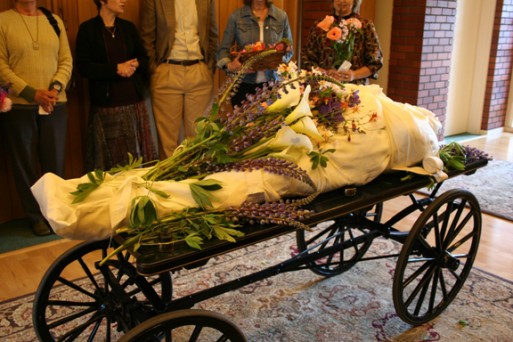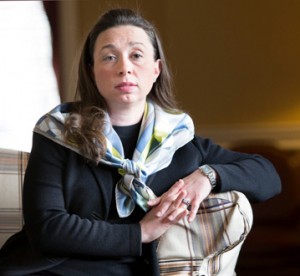
Credit: kinkaraco.com
Once death care was viewed as a woman’s job. The shrouding women washed the body of the deceased, anointed it with herbs, dressed and prepared it for a funeral or a wake. Women helped bring life into this world and also facilitated the departure from life by caring for the dead and the dying and comforting their families. The Civil War altered this tradition, turning funeral work into a lucrative, male-dominated industry.
“Women are more able to break down physical boundaries. People will accept a hug from a woman far more willingly than they will from a man.”
— Kim Stacey
Prior to the Civil War, embalming was viewed as something performed only in medical schools. As the war raged on and thousands of men died in battlefields far from home, their loved ones wanted the bodies brought home. Preservation of bodies through embalming became a popular practice and, eventually, a profitable business. The stringent mores of the Victorian era had already prohibited women from being business owners. Since embalming required knowledge of chemistry, and since women were considered unfit for science as well as for the physical and psychological demands of working with the deceased, the commercial aspect of funeral work removed them from their previous role as caretakers of the dead.

Marya F. Gibbons co-owner and funeral director of Gibbons Funeral Home
(Credit: Chicago.suntimes.com)
Now, more than a century later, women are returning to funeral work. In the last decade, the number of women funeral directors has increased by 70 percent. Not only is it a stable job that provides a decent income, but it is also a return to something that comes naturally to women. “Women are more patient and more willing to explain things,” Kim Stacey, the founder of the Association of Women Funeral Professionals, told Slate.com, “Women are more able to break down physical boundaries. People will accept a hug from a woman far more willingly than they will from a man.” Empathy is at the core of this job, and funeral work is becoming more of a calling.
Marya F. Gibbons, co-owner of Gibbons Funeral Home in Elmhurst IL, has been doing funeral work for twenty years. “I’m not man-bashing, but families find a comfort level with a female funeral director sometimes quicker and easier than with a male because a woman has a tendency to open up about herself and become a relatable person,” Gibbons told in an interview with Chicago Sun Times. Gibbons believes that women have personal strengths, such as empathy and patience, conducive to this line of work.
“…families find a comfort level with a female funeral director sometimes quicker and easier than with a male because a woman has a tendency to open up about herself and become a relatable person.”
— Marya F. Gibbons
Just like in any male-dominated field, women funeral directors still face their share of discrimination, but this trend is changing. Funeral work is shifting into the capable hands of women funeral directors, able to provide a comforting presence for the grieving family members, while creating unforgettable and unique funeral services.

 The Return of the Shrouding Women
The Return of the Shrouding Women


 Our Annual Seven Holiday Gifts for Someone Who Is Grieving, 2024 Edition
Our Annual Seven Holiday Gifts for Someone Who Is Grieving, 2024 Edition
 “Making Mobiles” by Karolina Merska
“Making Mobiles” by Karolina Merska
 “Hands Up to the Sky” by Michael Franti & Spearhead
“Hands Up to the Sky” by Michael Franti & Spearhead














